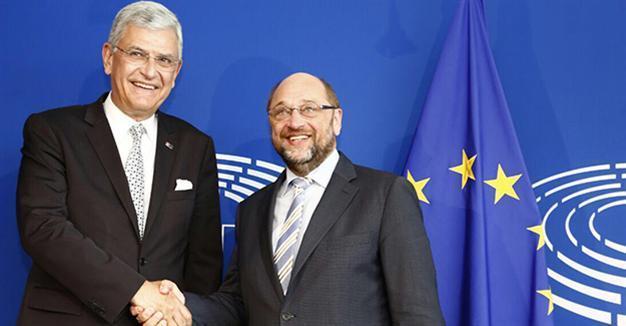Turkey-EU deal over visas, migrants in jeopardy amid brinkmanship
ANKARA

Amendments demanded for Turkey’s anti-terror law have put the Turkey-EU deal on migrants and visa-free travel in jeopardy, with the European Parliament halting the visa liberalization process.
“The draft that the European Commission has sent [to the European Parliament and the European Council] rests on 72 criteria. Turkey has not yet fulfilled all of these benchmarks. Therefore, I have halted the process,” said European Parliament President Martin Schulz at a press conference alongside Turkey’s EU Minister and Chief Negotiator Volkan Bozkır in Strasbourg on May 11, according to state-run Anadolu Agency.
“We cannot restart yet, for the time being,” Schulz added.
The commission said there were five key criteria left for Turkey to fulfil, of which amendments demanded on the anti-terror law have caused the biggest controversy.
Other criteria include the completion of flaws in relation to a new data protection law, operational cooperation with Europe’s police agency Europol, implementation of the Group of States against Corruption’s (GRECO) recommendations to combat corruption, and judicial cooperation with all EU member states.
Turkish President Recep Tayyip Erdoğan gave a fiery speech in Ankara on May 12, saying it was OK to “perceive the EU as a terrorist organization if it speaks with a terrorist organization rather than the Turkish state itself.”
“If the EU agrees to lower itself to the level of speaking with a terrorist organization instead of the Turkish Republic, then there is no problem from our side. We will look at the people defending their thesis in the same way as we look at the terrorist organization,” said Erdoğan, referring to the outlawed Kurdistan Workers’ Party (PKK), against which Turkey has ramped up clashes since July 2015.
“The EU says ‘soften your approach to the terrorist organization.’ Since when have you run this country? Who has given you this authority?” he added.
“They believe they themselves have a right [to fight terrorism] but it is an unacceptable luxury for us. Let me say it clearly, this is hypocrisy,” Erdoğan said.
He also accused “some countries” of supplying terrorist groups with money “to come to Turkey and conduct attacks and divide the country.”
“Do you think we don’t know this? We will not exchange the values ... of this country for a few laughs of yours,” said Erdoğan.
For his part, Bozkır said the visa deal situation had come to this “critical point” because amendments to the anti-terror law, which were not brought up until the last three days of the meetings, were added to the criteria late.
Reiterating his remarks from one day before, Bozkır said on May 12 that there was “no chance that Turkey would amend its anti-terror law” at a time when more than 450 security personnel have been killed in operations aimed at “clearing all of our regions of terrorists.”
“We will not make any changes to the anti-terror law, even if visas are not lifted,” said Bozkır in Strasbourg before departing for Brussels, while vowing that Ankara would put all its other efforts into realizing the implementation of the visa deal.
The EU, meanwhile, expressed no change in its position, vowing not to grant visas to Turkish citizens unless Turkey meets all the criteria.
European Commission President Jean-Claude Juncker insisted on May 12 that Europe would not grant visa-free travel to Turkish citizens if Ankara fails to fulfil its end of the deal.
“We consider that it is important for these conditions to be fulfilled, otherwise this deal between the EU and Turkey will not happen,” Juncker told a forum organized by German broadcaster WDR.
“If Mr. Erdoğan wants to pursue his strategy, then he has to answer to the Turkish people why Europe is denying free travel to Turks. That’s not my problem; that will be his problem,” he added.
The EU dangled the promise of visa-free travel to Turks as part of a landmark March deal between Ankara and Brussels, under which Turkey would help to reduce the flow of migrants crossing illegally to Europe.
Germany on May 12 also stepped up its calls for Turkey’s anti-terror law to be amended, with Foreign Minister Frank-Walter Steinmeier saying the EU is waiting to see “the readiness of Turkey to end persecution of journalists through the use of the anti-terror law.”
German Deputy Chancellor Sigmar Gabriel, speaking at a separate press conference, also urged Ankara to “allow the opposition and journalists to do their jobs” rather than use the law to “brand them as terrorists and lock them away.”
 Amendments demanded for Turkey’s anti-terror law have put the Turkey-EU deal on migrants and visa-free travel in jeopardy, with the European Parliament halting the visa liberalization process.
Amendments demanded for Turkey’s anti-terror law have put the Turkey-EU deal on migrants and visa-free travel in jeopardy, with the European Parliament halting the visa liberalization process.